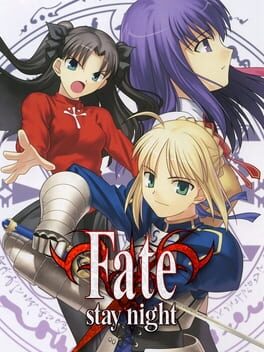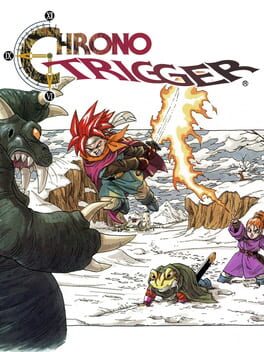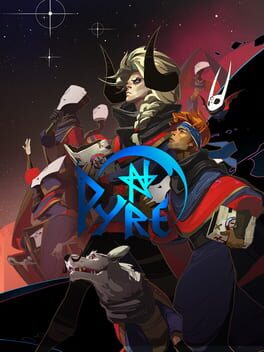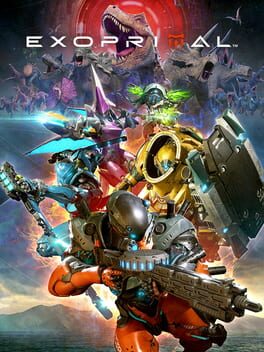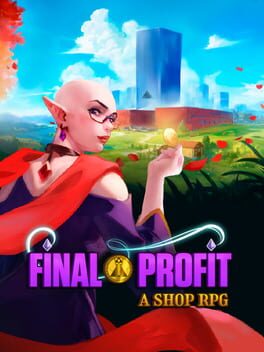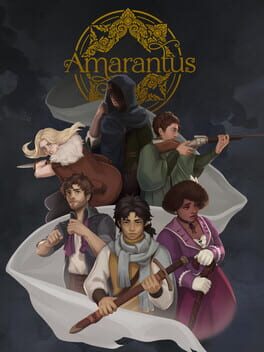Iro
Bio
Nothing here!
Badges

Popular
Gained 15+ followers

1 Years of Service
Being part of the Backloggd community for 1 year

Loved
Gained 100+ total review likes

Well Written
Gained 10+ likes on a single review

Noticed
Gained 3+ followers

Liked
Gained 10+ total review likes

Gone Gold
Received 5+ likes on a review while featured on the front page
Favorite Games
023
Total Games Played
000
Played in 2024
000
Games Backloggd
Recently Reviewed See More
Game's old news by now, but @yotsuben got it for me for Christmas (thanks to a price fuckup on Humble Bundle's part where it briefly cost something like a third of its intended sale price), and I did enjoy the betas, and there's a 2xEXP weekend running currently, so I've killed a lot of dinosaurs over the past week and wrapped up the story content.
It really sucks that Exoprimal was forced to be some kind of battle-pass live service game when all it really wants to be is a Left 4 Dead style cooperative horde-murderin' game with a loose story through-line. It's especially frustrating because the story is actually pretty good. The game is under no bones about being what it is: in this world people put on power armor and dive through time to shoot dinosaurs in the head. The raid boss is called a Neo T-Rex. They're in on the joke, and it means they can lean into it and not take themselves too seriously, and get some actual pathos out of it. The "Best Screwdriver" series of logs is some primo MGS-style codec call bullshit (complimentary).
As you might expect from a game with time travel, there's some goofy stuff involving time loops and such. It's pretty clear early on that Goddess Bikitoa was an exofighter sent further back than normal, but finding the log they left behind and the story details within was a solid "oh shit!" moment. I think the clear standout story stuff is with Alders, both his relationship with Sandy and his character arc after the confrontation with Durban. The scene where Maj can't come up with anything else to comfort him other than "you know what, fuck that asshole" feels more genuine to me than any number of inspirational speeches.
It's just that to get any to any of this good stuff, you have to hop into the multiplayer queue, and after each battle you get one or two lore logs with some audio of the characters talking about the situation. Collect enough about a specific subject and there's a longer codec call where all of those logs are compiled into some more concrete info. Certain battle thresholds have more produced story cutscenes and milestones accompanied by a special bespoke mission, often some kind of raid boss where all 10 players have to work together.
Any time I got the "special" missions (by far the most enjoyable experiences in the game), there was maybe one or two other humans playing and the rest were bots. I don't know how you're supposed to replay these unless the matchmaking decides to plop you in with a new player progressing through the story for the first time. You're definitely supposed to be able to because there are profile medals for, say, beating the final boss 5 and 10 times. Are they just... random in the queue? Who thought that was a good idea?
To see the entire plot, you have to play about 60-ish Dino Survival rounds, which are about 15-20 minutes apiece. Steam says I've played 26 hours, but a lot of that is waiting for matchmaking or fiddling with builds or leaving the game running while I made dinner or whatnot, I'd wager the actual gameplay time is closer to 20. Which, honestly, pretty reasonable... if, again, this wasn't a stupid live game.
Almost all your gameplay options are gated behind your level and your "Bikcoin" currency, which you get by... leveling up (to Capcom's credit, you cannot buy more Bikcoin). This includes the equippable chips that actually can alter your playstyle pretty drastically and the Alpha variants of every playable exo-suit, which each have different primary weapons and playstyles from their normal counterparts. You can't unlock an Alpha variant until you hit level 20 with a specific suit, and then it costs 15,000 Bikcoin just to unlock the Alpha. You might have spent 5000 just to unlock the regular Murasame suit. Then if you want the good chips, you're spending thousands more to unlock and upgrade those, only if you're a high enough player level.
It's not a problem for me now, because I'm 10 hours deep into the 2xEXP weekend and have like 70,000 Bikicoin laying around waiting to be spent on upgrades, but it's just tedious and frustrating in principle. I feel like I shouldn't play Roadblock Alpha, my favorite class, because that way I'm not earning up points to unlock the other stuff. Sucks! Please don't make progression this way especially in a competitive multiplayer environment where I am actively hindering my team by playing classes I'm bad at!!
And that's kind of the rub in general, right? I'm discouraged from getting invested in the story, from experimenting and enjoying the actually pretty cool and varied slate of classes because Exoprimal is a fucking competitive 5v5 live game and I feel like I'm under constant scrutiny to play well and not screw over my team. Yes Leviathan, I know that I'm completing objectives slower than the enemy team, how about you fuck right off? I hate what this does to me, because yes I do want to win, and more importantly I want to facilitate the other people on my team winning, and it means I become an asshole about playing properly and that the people on my team become assholes about playing properly, and this is why I no longer play Overwatch or Apex Legends or any "third place" game anymore.
At least when I get bodied in Street Fighter 6 I'm the only one who looks like an idiot.
It really sucks that Exoprimal was forced to be some kind of battle-pass live service game when all it really wants to be is a Left 4 Dead style cooperative horde-murderin' game with a loose story through-line. It's especially frustrating because the story is actually pretty good. The game is under no bones about being what it is: in this world people put on power armor and dive through time to shoot dinosaurs in the head. The raid boss is called a Neo T-Rex. They're in on the joke, and it means they can lean into it and not take themselves too seriously, and get some actual pathos out of it. The "Best Screwdriver" series of logs is some primo MGS-style codec call bullshit (complimentary).
As you might expect from a game with time travel, there's some goofy stuff involving time loops and such. It's pretty clear early on that Goddess Bikitoa was an exofighter sent further back than normal, but finding the log they left behind and the story details within was a solid "oh shit!" moment. I think the clear standout story stuff is with Alders, both his relationship with Sandy and his character arc after the confrontation with Durban. The scene where Maj can't come up with anything else to comfort him other than "you know what, fuck that asshole" feels more genuine to me than any number of inspirational speeches.
It's just that to get any to any of this good stuff, you have to hop into the multiplayer queue, and after each battle you get one or two lore logs with some audio of the characters talking about the situation. Collect enough about a specific subject and there's a longer codec call where all of those logs are compiled into some more concrete info. Certain battle thresholds have more produced story cutscenes and milestones accompanied by a special bespoke mission, often some kind of raid boss where all 10 players have to work together.
Any time I got the "special" missions (by far the most enjoyable experiences in the game), there was maybe one or two other humans playing and the rest were bots. I don't know how you're supposed to replay these unless the matchmaking decides to plop you in with a new player progressing through the story for the first time. You're definitely supposed to be able to because there are profile medals for, say, beating the final boss 5 and 10 times. Are they just... random in the queue? Who thought that was a good idea?
To see the entire plot, you have to play about 60-ish Dino Survival rounds, which are about 15-20 minutes apiece. Steam says I've played 26 hours, but a lot of that is waiting for matchmaking or fiddling with builds or leaving the game running while I made dinner or whatnot, I'd wager the actual gameplay time is closer to 20. Which, honestly, pretty reasonable... if, again, this wasn't a stupid live game.
Almost all your gameplay options are gated behind your level and your "Bikcoin" currency, which you get by... leveling up (to Capcom's credit, you cannot buy more Bikcoin). This includes the equippable chips that actually can alter your playstyle pretty drastically and the Alpha variants of every playable exo-suit, which each have different primary weapons and playstyles from their normal counterparts. You can't unlock an Alpha variant until you hit level 20 with a specific suit, and then it costs 15,000 Bikcoin just to unlock the Alpha. You might have spent 5000 just to unlock the regular Murasame suit. Then if you want the good chips, you're spending thousands more to unlock and upgrade those, only if you're a high enough player level.
It's not a problem for me now, because I'm 10 hours deep into the 2xEXP weekend and have like 70,000 Bikicoin laying around waiting to be spent on upgrades, but it's just tedious and frustrating in principle. I feel like I shouldn't play Roadblock Alpha, my favorite class, because that way I'm not earning up points to unlock the other stuff. Sucks! Please don't make progression this way especially in a competitive multiplayer environment where I am actively hindering my team by playing classes I'm bad at!!
And that's kind of the rub in general, right? I'm discouraged from getting invested in the story, from experimenting and enjoying the actually pretty cool and varied slate of classes because Exoprimal is a fucking competitive 5v5 live game and I feel like I'm under constant scrutiny to play well and not screw over my team. Yes Leviathan, I know that I'm completing objectives slower than the enemy team, how about you fuck right off? I hate what this does to me, because yes I do want to win, and more importantly I want to facilitate the other people on my team winning, and it means I become an asshole about playing properly and that the people on my team become assholes about playing properly, and this is why I no longer play Overwatch or Apex Legends or any "third place" game anymore.
At least when I get bodied in Street Fighter 6 I'm the only one who looks like an idiot.
Final Profit is a game made in RPG Maker in the broad lineage of Recettear and the like. You play as Queen Mab of the fey, who - when confronted by the encroaching economic power of the intensely corrupt Bureau of Business - decides that the only way to stop them is to go incognito, climb the corporate ladder, and beat them at their own game. (Because, you know, that always works when it comes to capitalism.)
As the newly christened Madama Biz, you start with a tiny shop in a backwater village; work your way up to an emporium in the big city; and eventually get yourself a holdings office on Fake Wall Street where you trade commodities, buy real estate, and speculate on stocks. All for the sake ofmaking profit stopping those vile business types.
Despite its engine, there's no direct combat in Final Profit (though there's certainly violence); your experience points are directly tied to your overall revenue. Thus, rather than by tough monsters or bosses, game progression is gated directly by your level in the early game and eventually by simply how much money you have to throw around regardless of your level. In fact, a late-game NPC will even let you trade out your EXP stores for a certain benefit that I won't spoil.
You do still want to level up, because it increases your HP and MP, of which you're going to need plenty. Various quests around the game world require you to cough up one or the other, and you often need to spend obscene amounts of mana just to stock up your warehouse or activate an upgrade. Queen Mab regenerates mana slowly over time, but you can also charge it up instantly by drinking alcohol (adding to your Alcoholism stat), easily purchasable in bulk from your nearby tavern.
So, like all clicker/idle games (and make no mistake, despite the overworld and sidequests, this is absolutely a clicker game), the game settles into a rhythm of switching between a few game flavors:
1) Managing your shop and accumulating money
2) Discovering new products that give you more efficient profit
3) Spending your money on incremental upgrades to your income stream
4) Repeat: Eventually you hit the next "tier" of total assets, where you must then effectively start from zero but with a new selection of much more profitable ventures.
Other than the inherent dopamine hit of "number go up", these kinds of games rely heavily on the curiosity value of seeing what kind of silly upgrade will appear next. Final Profit delivers on this by having a decent cast and story to keep you invested. It's nothing amazing, but the tone is whimsical and irreverent without edging into being twee about it (usually). It's willing to tell a bunch of dumb jokes, but when something relatively serious is happening, the storytelling treats those moments respectfully and doesn't undercut itself.
My favorite part of the game by far is the middle chapter where you're trying to build up your emporium. The game keeps new products, quests to improve your current products, quests to recruit new customers, and wacky side adventures coming at a solid pace, along with a looming debt goal to keep you on track. I had a good chuckle the first time I brought the Artist through the shortcut dimension or encountered a certain avian character.
(Aside: I do have to shout out the mini-chapter with an investigation that takes place entirely on a train moving from one city to the other, which is one of my weird pet favorite tropes ever since I played Paper Mario 2)
As for the main narrative, it's mostly about whether or not Madama Biz can actually participate in capitalism without succumbing to its worst impulses. Nearly every choice in the game boils down to either doing something that's morally good but negatively impacts your profit margin, or something that's morally negligent-to-actively-evil for the sake of bigger gains. This is mostly in favor of letting the game proffer its core fantasy of letting you be a good capitalist, and I'm a bit torn on how it all shakes out.
Like, okay, we all know that moral choice systems are often bullshit. Possibly the most infamous example that highlights my point is Bioshock, where you could either kill children for more magic currency or spare them for warm-and-fuzzies but a smaller reward... except you would get special care packages after certain spare thresholds demonstrably better than if you just killed all of them. Thus, it's a non-choice.
I tried to be Nice at every possible opportunity in Final Profit, and you know what? It did affect my profit margins. The game was very clear that, for example, I could either stock a product for 128g apiece or accept a favorable discount for 100g apiece that might negatively affect the supplier down the line. By the time you hit the next "tier", this difference might as well be negligible, but it's nothing to sneeze at in the moment. The problem is it eventually starts to feel like you're just making things take longer for the sake of not seeing a sad face in the dialogue window, and boy do things start to take a long time.
I'm a little too aware of my ADHD brain now to get as taken in by clicker/idle games as I once was. If you give me two dozen upgrades that will each take a good 15-20 minutes to save up for and will each improve my income by like 1-10%, then fuck it. I will open Cheat Engine or a save editor and crank up my money or product stock to avoid having to wait around spinning plates indefinitely. So sue me.
Getting back on track, there's some of that ol' ludonarrative dissonance or what have you going on. You're fundamentally participating in capital in order to defeat capital. While nationalization and sustainability and fair trade are always presented as the "good" options, the question of The Economy At Large starts to loom in the back. Money might as well appear from and disappear into a black hole; does the Bureau mint the coins and distribute the currency? Like, if you have the cash to pay for it, most product stock is infinite. You can purchase property, but from whom? Previous owners are listed, but they appear to lack the ability to refuse your offer (because they don't have the Property Vision spell, I guess), simply grumbling and paying their rent every tick.All salable products grow in sale price as you sell more of them, when it should be the opposite if you're flooding the market.
I get it. It's a video game. You gotta have progression somehow. I wouldn't think about it too hard if the game itself didn't gesture towards these things, though.
(aside: I thought about it a little more and regarding that last point, every product is actually consumable or addictive in some way that justifies it not oversaturating the market, so that's to the game's credit [but dang it sure makes your entire mission even more inherently unethical])
I hear there's actually quite a bit of story and ending mutability depending on your specific choices as well as NG+ content, but for now I think I'm satisfied with Final Profit. It's got fairly novel gameplay, some clever and funny writing, and plenty of optional completionist tasks if those are your kind of thing. It's a great example of the kinds of things possible with a tool like RPG Maker (you know, besides indie horror games).
As the newly christened Madama Biz, you start with a tiny shop in a backwater village; work your way up to an emporium in the big city; and eventually get yourself a holdings office on Fake Wall Street where you trade commodities, buy real estate, and speculate on stocks. All for the sake of
Despite its engine, there's no direct combat in Final Profit (though there's certainly violence); your experience points are directly tied to your overall revenue. Thus, rather than by tough monsters or bosses, game progression is gated directly by your level in the early game and eventually by simply how much money you have to throw around regardless of your level. In fact, a late-game NPC will even let you trade out your EXP stores for a certain benefit that I won't spoil.
You do still want to level up, because it increases your HP and MP, of which you're going to need plenty. Various quests around the game world require you to cough up one or the other, and you often need to spend obscene amounts of mana just to stock up your warehouse or activate an upgrade. Queen Mab regenerates mana slowly over time, but you can also charge it up instantly by drinking alcohol (adding to your Alcoholism stat), easily purchasable in bulk from your nearby tavern.
So, like all clicker/idle games (and make no mistake, despite the overworld and sidequests, this is absolutely a clicker game), the game settles into a rhythm of switching between a few game flavors:
1) Managing your shop and accumulating money
2) Discovering new products that give you more efficient profit
3) Spending your money on incremental upgrades to your income stream
4) Repeat: Eventually you hit the next "tier" of total assets, where you must then effectively start from zero but with a new selection of much more profitable ventures.
Other than the inherent dopamine hit of "number go up", these kinds of games rely heavily on the curiosity value of seeing what kind of silly upgrade will appear next. Final Profit delivers on this by having a decent cast and story to keep you invested. It's nothing amazing, but the tone is whimsical and irreverent without edging into being twee about it (usually). It's willing to tell a bunch of dumb jokes, but when something relatively serious is happening, the storytelling treats those moments respectfully and doesn't undercut itself.
My favorite part of the game by far is the middle chapter where you're trying to build up your emporium. The game keeps new products, quests to improve your current products, quests to recruit new customers, and wacky side adventures coming at a solid pace, along with a looming debt goal to keep you on track. I had a good chuckle the first time I brought the Artist through the shortcut dimension or encountered a certain avian character.
(Aside: I do have to shout out the mini-chapter with an investigation that takes place entirely on a train moving from one city to the other, which is one of my weird pet favorite tropes ever since I played Paper Mario 2)
As for the main narrative, it's mostly about whether or not Madama Biz can actually participate in capitalism without succumbing to its worst impulses. Nearly every choice in the game boils down to either doing something that's morally good but negatively impacts your profit margin, or something that's morally negligent-to-actively-evil for the sake of bigger gains. This is mostly in favor of letting the game proffer its core fantasy of letting you be a good capitalist, and I'm a bit torn on how it all shakes out.
Like, okay, we all know that moral choice systems are often bullshit. Possibly the most infamous example that highlights my point is Bioshock, where you could either kill children for more magic currency or spare them for warm-and-fuzzies but a smaller reward... except you would get special care packages after certain spare thresholds demonstrably better than if you just killed all of them. Thus, it's a non-choice.
I tried to be Nice at every possible opportunity in Final Profit, and you know what? It did affect my profit margins. The game was very clear that, for example, I could either stock a product for 128g apiece or accept a favorable discount for 100g apiece that might negatively affect the supplier down the line. By the time you hit the next "tier", this difference might as well be negligible, but it's nothing to sneeze at in the moment. The problem is it eventually starts to feel like you're just making things take longer for the sake of not seeing a sad face in the dialogue window, and boy do things start to take a long time.
I'm a little too aware of my ADHD brain now to get as taken in by clicker/idle games as I once was. If you give me two dozen upgrades that will each take a good 15-20 minutes to save up for and will each improve my income by like 1-10%, then fuck it. I will open Cheat Engine or a save editor and crank up my money or product stock to avoid having to wait around spinning plates indefinitely. So sue me.
Getting back on track, there's some of that ol' ludonarrative dissonance or what have you going on. You're fundamentally participating in capital in order to defeat capital. While nationalization and sustainability and fair trade are always presented as the "good" options, the question of The Economy At Large starts to loom in the back. Money might as well appear from and disappear into a black hole; does the Bureau mint the coins and distribute the currency? Like, if you have the cash to pay for it, most product stock is infinite. You can purchase property, but from whom? Previous owners are listed, but they appear to lack the ability to refuse your offer (because they don't have the Property Vision spell, I guess), simply grumbling and paying their rent every tick.
I get it. It's a video game. You gotta have progression somehow. I wouldn't think about it too hard if the game itself didn't gesture towards these things, though.
(aside: I thought about it a little more and regarding that last point, every product is actually consumable or addictive in some way that justifies it not oversaturating the market, so that's to the game's credit [but dang it sure makes your entire mission even more inherently unethical])
I hear there's actually quite a bit of story and ending mutability depending on your specific choices as well as NG+ content, but for now I think I'm satisfied with Final Profit. It's got fairly novel gameplay, some clever and funny writing, and plenty of optional completionist tasks if those are your kind of thing. It's a great example of the kinds of things possible with a tool like RPG Maker (you know, besides indie horror games).
A western-made visual novel that actually does things with the medium! And does them well. A rarity, to be cherished.
(At this point I spent a very long time staring at the draft of this post, pondering how I could write this in a way that wasn't as mechanical and wooden as my usual output, in a way that does justice to the impressive writing within Amarantus. I did not succeed. Workmanlike it is.)
Amarantus takes place in a sort of low-fantasy world where you play as a young man named Arik Tereison. The game opens with the lord's soldiers raiding his house in the dead of night, capturing his parents while he only just escapes. Arik assembles a small team of friends and acquaintances with the intent to march to the capital and Do Something About This.
The core story doesn't really change based on your choices; it's Arik's relationships with his team that do. I'd kill to see this game's internal flowchart. There's a huge amount of mutability based on what you say, and it's complex enough that I genuinely have no clue how to reach certain branches. The choices do matter and do have consequences, and they can be so small that you don't notice until they compound into a situation that smashes the back of your skull with a hammer.
The game shoves you into the deep end, expecting you to figure out the pre-existing relationship dynamics and state of the world almost purely via context clues. Thankfully, the writing is strong enough to support this approach, and the game is short as to facilitate multiple playthroughs. It trickles just enough information that I experienced multiple "oh my god, I knew it!" and "holy shit, they were actually talking about this!" moments in equal measure through subsequent runs.
This approach allows the game to squeeze tons of value out of its limited cast, who each have an impressive sense of specificity and agency. I'm used to companions in games simply following my lead and doing what I say, but would Marius stop trying to score with Raeann just because I told him to? Of course he wouldn't, he's a fucking disaster of a human being. You can't hook up with characters just by being nice like in most games with romance options (lookin at you, Baldur's Gate 3). You have to actually act in a way they're interested in.
The writing in Amarantus - the dialogue, really - is genuinely impressive. There's a heavy emphasis on naturalistic timing, taking full advantage of the Power of Computers to display things at various speeds. You know that awkward, beat-too-long pause where the game has to load the next line, even if the next line is supposed to be immediate? None of that shit here. Characters will pause to sigh, visibly hesitate to answer, interrupt themselves and others; all without waiting for player input. Words will change depending on how characters are pronouncing them.
I cannot overstate how huge this is. The classic fetter of visual novels is limited expressions and how one deals with that restriction. For example, Ace Attorney uses bombastic, hammy animations to convey character, which works well because every character is some kind of larger-than-life caricature. Amarantus has subtler writing and these accordingly subtler animations elevate it from great to amazing.
And just, man, I gotta get back in there, test every possible combination of choices. Some of my favorite dialogue in that game so far is in a scene that - according to the achievement statistics at time of writing - 2.5% of players have seen. And I can't imagine that many people are playing something as niche as this in the first place.
Honestly between Amarantus, Exocolonist, Citizen Sleeper, Roadwarden, and South Scrimshaw: Part One, I'm eatin' well from the "high-quality narrative game of relatively modest scope" table. Keep 'em coming.
(At this point I spent a very long time staring at the draft of this post, pondering how I could write this in a way that wasn't as mechanical and wooden as my usual output, in a way that does justice to the impressive writing within Amarantus. I did not succeed. Workmanlike it is.)
Amarantus takes place in a sort of low-fantasy world where you play as a young man named Arik Tereison. The game opens with the lord's soldiers raiding his house in the dead of night, capturing his parents while he only just escapes. Arik assembles a small team of friends and acquaintances with the intent to march to the capital and Do Something About This.
The core story doesn't really change based on your choices; it's Arik's relationships with his team that do. I'd kill to see this game's internal flowchart. There's a huge amount of mutability based on what you say, and it's complex enough that I genuinely have no clue how to reach certain branches. The choices do matter and do have consequences, and they can be so small that you don't notice until they compound into a situation that smashes the back of your skull with a hammer.
The game shoves you into the deep end, expecting you to figure out the pre-existing relationship dynamics and state of the world almost purely via context clues. Thankfully, the writing is strong enough to support this approach, and the game is short as to facilitate multiple playthroughs. It trickles just enough information that I experienced multiple "oh my god, I knew it!" and "holy shit, they were actually talking about this!" moments in equal measure through subsequent runs.
This approach allows the game to squeeze tons of value out of its limited cast, who each have an impressive sense of specificity and agency. I'm used to companions in games simply following my lead and doing what I say, but would Marius stop trying to score with Raeann just because I told him to? Of course he wouldn't, he's a fucking disaster of a human being. You can't hook up with characters just by being nice like in most games with romance options (lookin at you, Baldur's Gate 3). You have to actually act in a way they're interested in.
The writing in Amarantus - the dialogue, really - is genuinely impressive. There's a heavy emphasis on naturalistic timing, taking full advantage of the Power of Computers to display things at various speeds. You know that awkward, beat-too-long pause where the game has to load the next line, even if the next line is supposed to be immediate? None of that shit here. Characters will pause to sigh, visibly hesitate to answer, interrupt themselves and others; all without waiting for player input. Words will change depending on how characters are pronouncing them.
I cannot overstate how huge this is. The classic fetter of visual novels is limited expressions and how one deals with that restriction. For example, Ace Attorney uses bombastic, hammy animations to convey character, which works well because every character is some kind of larger-than-life caricature. Amarantus has subtler writing and these accordingly subtler animations elevate it from great to amazing.
And just, man, I gotta get back in there, test every possible combination of choices. Some of my favorite dialogue in that game so far is in a scene that - according to the achievement statistics at time of writing - 2.5% of players have seen. And I can't imagine that many people are playing something as niche as this in the first place.
Honestly between Amarantus, Exocolonist, Citizen Sleeper, Roadwarden, and South Scrimshaw: Part One, I'm eatin' well from the "high-quality narrative game of relatively modest scope" table. Keep 'em coming.
